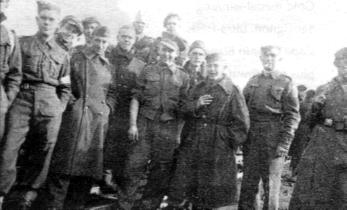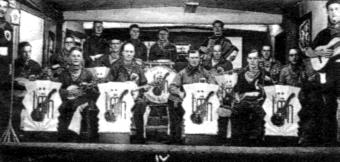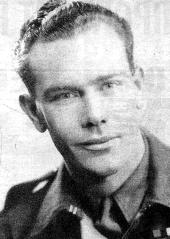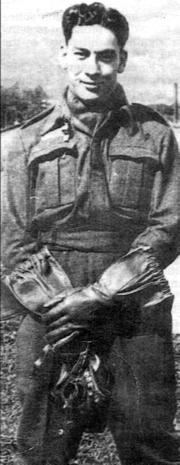Coping with life in a prison camp
When Norman Barnett signed up with the Territorial Army, it was to avoid being conscripted into the Bevin Boys.
Dreading the thought of being forced into the mines as part of the war effort, the 19-year-old joined the TA's medical corps at its Union Road barracks in Croydon.
But a few months into service. Norman found himself at the mercy of the Germans when he was captured in Belgium on May 28,1940.

Image: Norman on far left with POW's and guard on far right.
"Like everyone else, I was Tommy Titting myself," says Norman. "We received the order to retreat and knew Gerry was coming but every bridge out of Belgium had been blown up."
Ferocious German gunfire forced the unit to take cover in the field ambulances and blankets were placed up against the bullet-ridden canvas while they made their escape through a hole in the other side of the vehicle.
"We took cover in a ditch and crawled to the nearest farm, but we were caught," says the 85 year old, who now lives in Mitcham.
Norman and his fellow captives were forced to march for weeks to the camps, sleeping in fields and eating raw vegetables when they found them.
Norman celebrated his 20th birthday in a camp on the Belgium/Germany border.
It was mid-June when Norman arrived at what was to be his home for the next three and a half years, the Stalag 8B PoW camp, three kilometres from Lamsdorf in Germany.
"It was massive and made up of different compounds," says Norman. "There were rows of three-tier bunks.
"Around 90 per cent of prisoners were English but there were also some French, a few Serbs and Canadian RAF's, who were our main source of news on the war.
"We were always cold and hungry. Our diet was appalling and everyone had dysentery."
Norman volunteered to join the camp's working party, undertaking physical labour for the Germans. "If you were on the working party you were looked after a bit better. They had to give you a bit more food to keep your strength up."

Image: Norman on back right played in the Stalag's band.
Although prison life was hard, Norman says his treatment was better than at a camp full of Russian PoW's nearby.
He adds: "The Russian prisoners weren't covered by the Geneva Convention and were treated like animals. I saw starving Russian PoW's being used like horses to pull carts piled high with their own dead. The poor devils were so cold they fought each other to get the clothes off the dead."
Prisoners would use soap, toothpaste and cigarettes to barter with the guards.
"Even if you didn't smoke, everyone used cigarettes as currency," he adds. "And 97 per cent of those who escaped were recaptured.
"The Germans opened the Red Cross tins so they could not be saved for escapes."
Norman also used his experience in the medical corps to work in the hospital, helping patients with malnutrition, frostbite and amputations as well as more common procedures.

The swiss Red Cross provided board games and musical instruments for the prisoners to boost morale.
Norman adds: "We were bored but the camaraderie was very strong. The prisoners even formed a football team. God knows how, but they even managed to stitch together kit out of bits and pieces.
"When the Swiss gave us the musical instruments we formed a band called the Lamsdorf Melody Makers and we used to play for the camp. I was the accordion player."
Norman managed to collect a number of photographs taken by the guards.
"The worst thing was not knowing when you were going to get out," says Norman. "After I'd been there for 18 months I didn't know if I would ever get out. Then two years, then three.
"There was once talk of a prisoner exchange halfway through my 'sentence' but it never happened. When it was
years, I didn't get my hopes up."
However, at the end of 1943 Norman was released as part of a PoW exchange. He adds: "The Germans told me I couldn't take any photographs with the guards in, so I smuggled them out in my accordion. As I was leaving a guard asked me to prove the accordion was mine.
"I remember playing the damn thing and hearing the pictures of the guards fluttering about inside."
Norman, along with other prisoners, was put on a train to Sweden and from there crossed the North Sea from Gottenberg, docking in Scotland. He was allowed three weeks' leave before returning to military service in Britain. He never saw action again during World War Two.
This year, Norman returned to Belgium with his two sons to visit the spot where he was captured. And once a year, he meets up with other survivors of Stalag 8B.
Norman, a grandfather-of-five and great-grandfather-of-four, adds: "There aren't too many of us left now, but we try and meet up every year in Godstone. Ours wasn't a pleasant experience, but compared to other PoW camps in Japan, we were ok. You forge strong bonds with others in the camps.
"I'm just grateful I lived to tell the tale, and I have many pictures to go with my memories."

Image: Stanley Hart flew in a Lancaster bomber as a wireless operator and gunner.
Additional to the report on 07/12/05 in the Croydon Guardian.
Two World War Two veterans have been reunited after 67 years apart.
Norman Barnett, 85, and Stanley Hart, 83, both thought the other had been killed in action but this week came face to face for the first time since 1938.
The reunion came after Stanley read about Norman's experience as a POW in last week's Croydon Guardian and contacted the newsroom.
On Sunday, the two friends enjoyed an emotional meeting at Stanley's home in Limpsfield Road, Warlingham.
"I couldn't believe it when I opened the paper and saw my old friend Norman staring back at me," said Croydon-born Stanley. "Back then 1 knew him as Ginger Barnett.
"Even though I was born in Croydon, 1 moved to Beddington when I was young and we both went to the village school.
"The last time I saw him was at a Crystal Palace match when I was 14. I got a job after leaving school then joined the RAF to serve in the war.
"I had heard Norman was killed and believed for many years he was dead. So I was amazed to read that he had been captured by the Germans.
"It was lovely to see him after all these years - we had a lot of catching up to do."
Lifelong Eagles fan Norman, who lives in Mitcham, said: "I heard Stanley's aircraft had been shot down and that he'd died. I can't tell you what a shock it was to hear from him.
"We spent a lot of time together on Sunday, catching up with the news and swapping war stories. It's marvellous to see him. To think we've lived just a few miles apart for all this time is amazing really."
